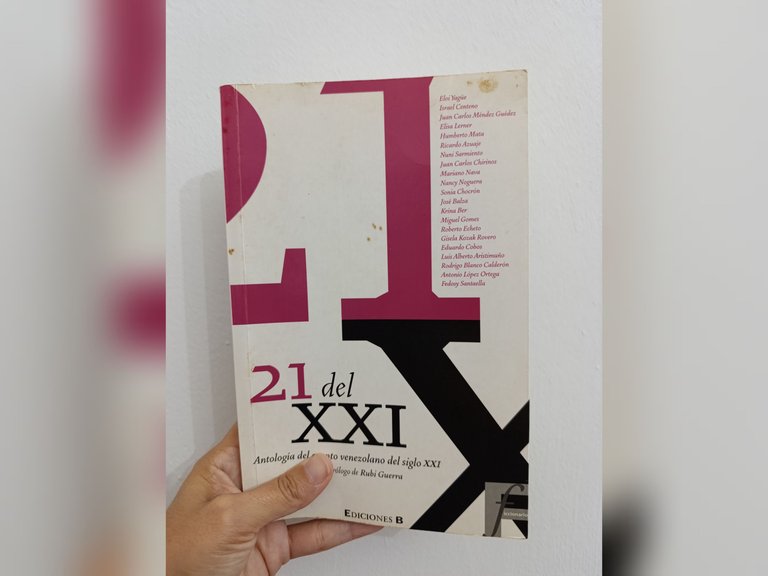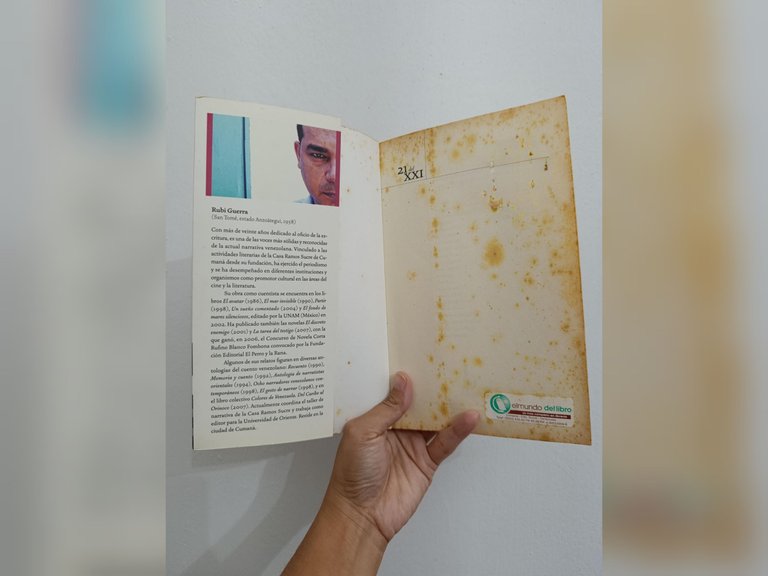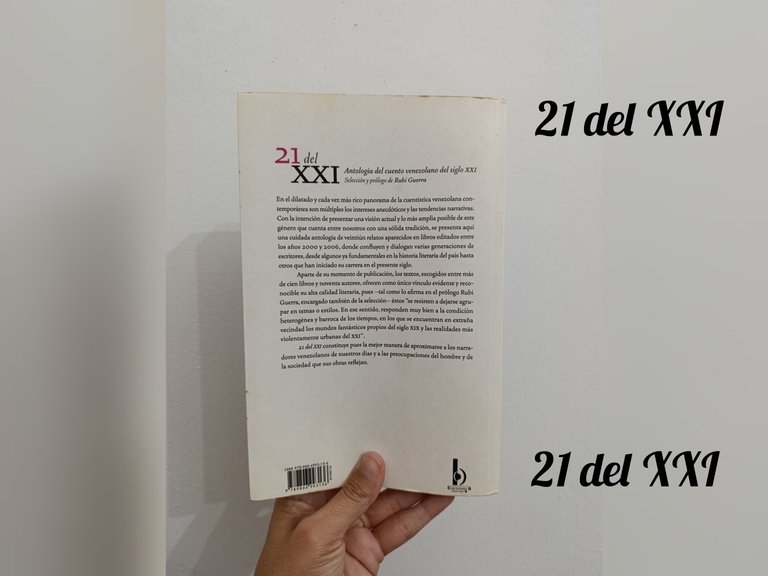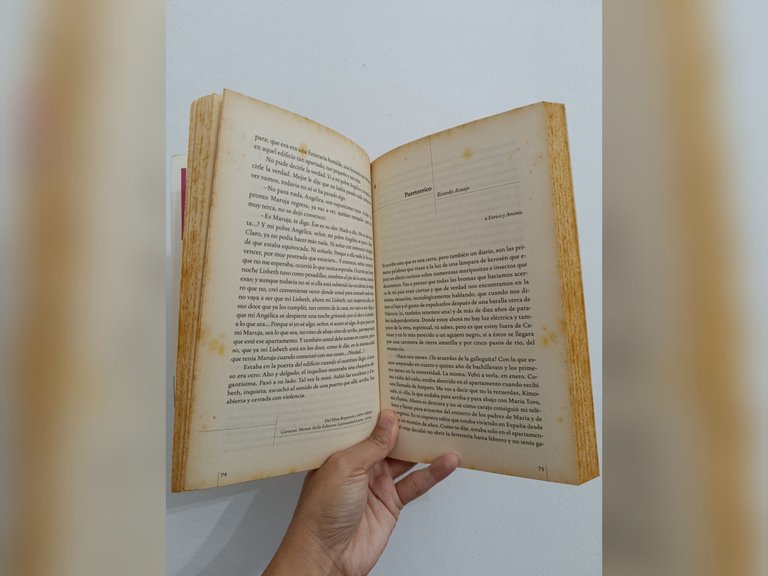Today I am going to share with you my impressions about the book 21 del XXI, an anthology of short stories written by Venezuelan authors of this century, whose selection and prologue are in charge of Rubi Guerra, a renowned writer, belonging to this same generation, whose professional career spans some 35 years dedicated to literature.

From the selection of stories, on this occasion, I will highlight three, one of them being The inconvenience of serving two bosses by Eloi Yagüe, a writer whose experience in journalism can be felt in his works. Framing literature of violence with satirical narrative is undoubtedly an art and here the author presents a very attractive aesthetic proposal. The drug mafias and the corruption of the judicial system are amalgamated in a story whose characters have very similar names and characteristics, which is arranged in a premeditated way to generate a sense of chaos. In addition, the narrator offers four endings for the reader to choose from.

Another proposal that I found very interesting was the one made by the renowned writer Juan Carlos Méndez Guédez in his story Bruno's bicycle. The proposed narrative leads to doubt between the authentic and the images that are presented through a feverish delirium. The protagonist confesses his acts of xenophobia in his childhood, a remorse that he carries over the years. When he falls ill, the narrative storm is unleashed, where plots are superimposed and the reader must sharpen his senses in order not to lose the horizon. The author manages to transfigure elements and relocate the focalization in a masterful way, including the insertion of Bruno's reference and what his bicycle represents is magnificent, building a story worthy of an analysis of literary theory.

On the other hand, in the story Adoption, by author Nancy Noguera, all the weight is given to the story as such, leaving the rest of the elements such as characters, plots and scenarios in the background. The narrative introduces us to a single mother who goes to live with a neighboring couple, a couple that proposes to legally adopt her little girl. Although the answer to the request is negative, the woman leaves her daughter and returns three years later asking for money in exchange for not claiming her daughter through the courts. The couple gives in to the blackmail, but then more events ensue when the woman returns to execute another blackmail. The climax and denouement are very well constructed and leave us with a story where everyday life becomes news.

In short, a great thematic and stylistic variety stands out in this book, as reflected in the chosen stories. A diversity that invites reflection and evokes the conditions in which they were conceived, they respond, therefore, to an era and a need that is important to analyze because although almost 20 years have passed since their publication, the themes, language and aesthetic approaches are still relevant.
Versión en EspañolHoy les voy a compartir mis impresiones sobre el libro 21 del XXI, una antología de cuentos escritos por autores venezolanos de este siglo, cuya selección y prólogo están a cargo de Rubi Guerra, reconocido escritor, perteneciente a esta misma generación, cuya trayectoria profesional abarca unos 35 años dedicados a las letras.

De la selección de relatos, en esta ocasión, resaltaré tres, siendo uno de ellos La inconveniencia de servir a dos patronos de Eloi Yagüe, escritor cuya experiencia en periodismo se deja sentir en sus obras. Enmarcar literatura de violencia con narrativa satírica es sin duda un arte y acá el autor presenta una propuesta estética muy atractiva. Las mafias de la droga y la corrupción del sistema judicial se amalgaman en una historia cuyos personajes tienen nombres y características muy similares, lo que se dispone de forma premeditada para generar una sensación de caos. Además, el narrador ofrece cuatro finales para que el lector se incliné por el que considere más adecuado.

Otra propuesta que me pareció muy interesante fue la realizada por el reconocido escritor Juan Carlos Méndez Guédez en su relato La bicicleta de Bruno. La narrativa planteada lleva a dudar entre lo auténtico y las imágenes que se presentan a través de un delirio febril. El protagonista confiesa sus actos de xenofobia en su etapa de niñez, remordimiento que arrastra a lo largo de los años. Al caer enfermo se desata la tormenta narrativa donde se superponen las tramas y el lector debe agudizar sus sentidos para no perder el horizonte. El autor logra transfigurar elementos y reubicar la focalización de forma magistral, inclusive la inserción del referente de Bruno y lo que representa su bicicleta es magnífica, construyendo un cuento digno de un análisis de teoría literaria.

Por otra parte, en el relato Adopción, de la autora Nancy Noguera, se concede todo el peso a la historia como tal, dejando en segundo plano al resto de elementos como personajes, tramas y escenarios. La narración nos presenta a una madre soltera que se va a vivir con un matrimonio vecino, pareja que le propone adoptar legalmente a su pequeña niña. Si bien la respuesta a la petición es negativa, la mujer deja a su hija regresando a los tres años pidiendo dinero a cambio de no reclamar a su hija por medio de tribunales. El matrimonio cede ante el chantaje, pero luego sobrevienen más sucesos cuando la mujer vuelve a ejecutar otro chantaje. El clímax y el desenlace están muy bien construidos y nos deja este relato donde la cotidianidad pasa a ser noticia.

En definitiva, en este libro se destaca una gran variedad temática y estilística, tal como se refleja en los relatos escogidos. Una diversidad que invita a la reflexión y evoca las condiciones en las cuales fueron concebidos, responden, por tanto, a una época y a una necesidad que es importante analizar porque si bien han transcurrido casi 20 años desde su publicación, las temáticas, el lenguaje y los planteamientos estéticos todavía mantienen vigencia.
✓Photos from my personal gallery, edited with Fotocollage.
✓Text translated with DeepL.
✓Fotos de mi galería personal, editadas con Fotocollage.
✓Texto traducido con DeepL.
Posted Using INLEO



